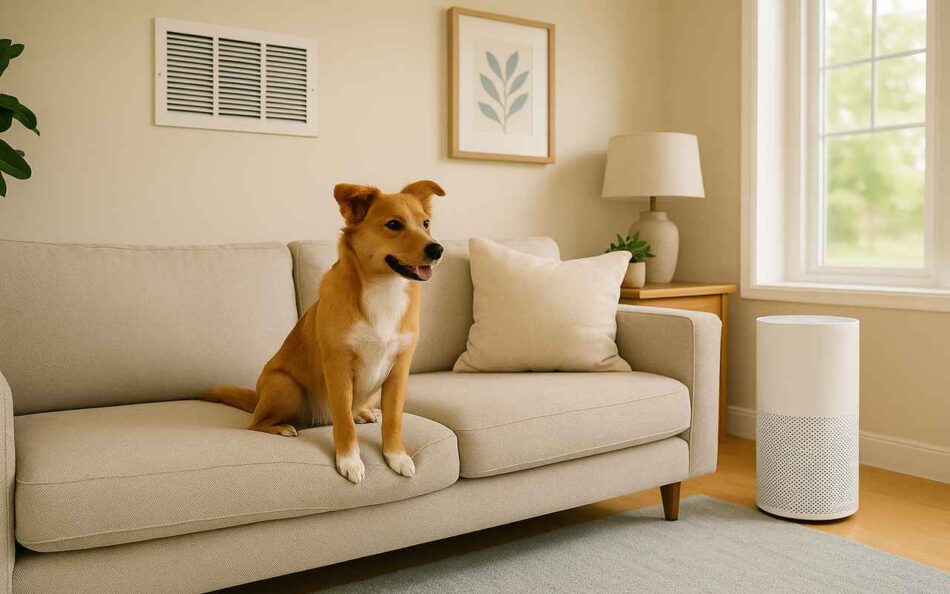How Pets Affect Your Indoor Air Quality

Why Pet Owners Should Care About Indoor Air Quality
If you share your home with cats or dogs, you’re already familiar with the joy they bring and probably the hair they leave behind. But what many Florida homeowners don’t realize is how much pets can quietly degrade pet air quality in your home. Dander, fur, saliva proteins, and even litter dust or outdoor debris can cycle through your HVAC system every time it kicks on.
Poor pet air quality can contribute to respiratory irritation, allergy flare-ups, and that musty feeling that lingers no matter how much you clean. If you’ve ever walked into your home and noticed a lingering odor or felt like the air feels “thicker,” your pets could be a big part of the reason.
How Pets Contribute to Air Quality Problems
Pet-related contaminants build up quickly, especially during Florida’s long cooling season when the AC runs almost constantly and windows stay shut. These are the main issues that arise:
Pet Dander – Microscopic skin flakes are invisible to the eye but stay suspended in the air much longer than pet hair. Once dander enters your HVAC system, it coats filters, duct interiors, and vents, circulating through the house with every cycle. For those with allergies, even small amounts can trigger symptoms.
Hair and Fur Accumulation – Unlike dander, hair is visible, but it still manages to sneak into return vents, clog up filters, and gather in ductwork. This buildup restricts airflow, forces your HVAC system to work harder, and reduces efficiency. It also contributes to uneven cooling and warm spots in the home.
Tracked-In Allergens – Outdoor pets bring pollen, mold spores, lawn chemicals, and dust indoors on their paws and fur. Once inside, these contaminants become airborne and move through the ventilation system, adding another layer of irritation to your indoor air.
Odor and Moisture – Pet odors can be tough to eliminate, especially if they are absorbed into ductwork or filters. Litter boxes, wet fur, and pet accidents introduce moisture and organic matter into the air, which can lead to unpleasant smells and even mold formation if not addressed.
How to Improve Pet Air Quality in Your Home
Improving indoor air quality with pets doesn’t mean sacrificing comfort or asking your furry companions to spend more time outside. It means creating a plan that balances HVAC performance and clean air. Here’s how to start:
Change Filters More Frequently – Homes with pets need more aggressive filter management. Check filters every 30 days and replace them at least every 60 days. Look for pleated filters with MERV ratings of 8 to 13, which capture finer particles like dander and dust.
Schedule Regular Duct Cleaning – Ducts accumulate pet debris over time. If your system is older or hasn’t been cleaned in several years, consider a professional duct cleaning to restore air quality. This helps eliminate allergens hiding in hard-to-reach places and supports better system performance.
Use Whole-Home Air Purification – Supplement your HVAC system with a dedicated air purifier or UV light. These systems work inside your ductwork to capture and neutralize airborne particles, bacteria, and pet-related contaminants before they circulate through your home.
Vacuum and Dust More Often – In homes with pets, surfaces accumulate dander and hair much faster. Use HEPA vacuums and microfiber cloths to trap particles instead of redistributing them. Pay special attention to upholstery, rugs, and vents.
Groom Your Pets Regularly – Frequent brushing and bathing help reduce the amount of shedding that ends up in your HVAC system. Grooming outdoors can further limit airborne dander and lessen the load on your air filter.
Pet Owners and HVAC Maintenance in Florida
Living in Florida means relying on your air conditioning system almost year-round. When pets are part of the household, the strain on your HVAC system increases. Hair and dander build up faster, filters clog sooner, and your unit may run longer to maintain the same comfort levels. These conditions shorten the life of your components and increase the risk of breakdowns if ignored.
That’s why regular HVAC maintenance is especially important for pet owners. During a service visit, we inspect your blower motor, coil, and filter system — all areas where pet hair and dust tend to collect. Routine maintenance keeps air moving freely, improves comfort, and prevents indoor air from feeling stale or stagnant.
Need Cleaner Air? We Can Help
At Cusano Air Conditioning, we help Florida pet owners breathe easier. Whether you need a better air filter, a whole-home purifier, or help cleaning out ductwork that hasn’t been touched in years, we’ve got solutions that work. Our team will walk you through smart options to improve pet air quality without adding more hassle to your life.
Call now at 954-472-8002 to schedule your indoor air quality consultation.